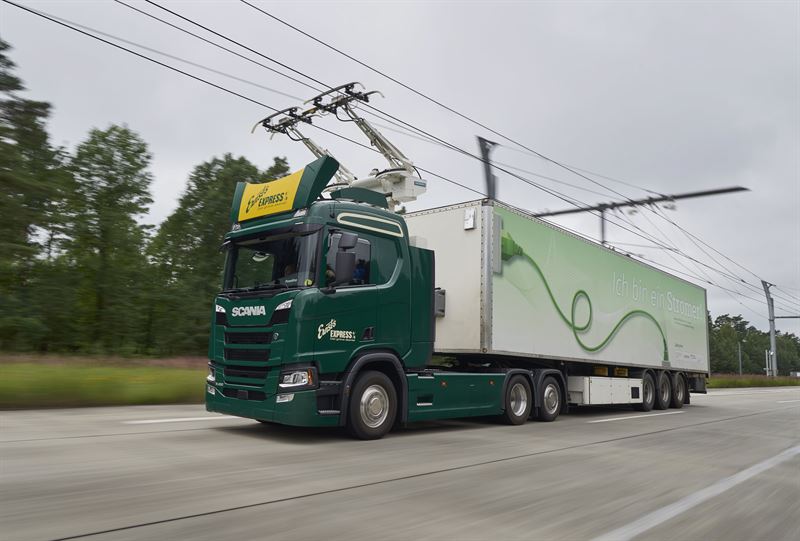Scania to supply “Trucks for German eHighways” research project

The German Government has today decided to co-finance a research project to test and develop electric road technology for eHighways. Volkswagen Group Research together with Siemens will develop technology and electric hybrid long-haulage trucks supplied by Scania for the German eHighway research project. This research is a pre-phase before the start-up of three different test areas on German public roads, with electric power supplied from overhead lines.
The project, “Trucks for German eHighways”, aims to reduce carbon emissions from long-haul heavy-duty commercial vehicles. During 2019 and 2020 electrically-powered trucks are to be tested on three new German eHighways. The project is co-financed by the German Government through BMUB, the Federal Ministry of the Environment, Nature Conservation and Nuclear Safety.
One test road will be built in Schleswig-Holstein on the A1 Autobahn close to Lübeck, one in Hessen on the A5 Autobahn south of Frankfurt, and a third in Baden-Württemberg on the B462 federal highway.
“For long-haulage transport, Scania sees electric roads as one promising technology for a sustainable transport future. Vehicle electrification is developing quickly and with its environmental, social and cost benefits, it will play an important role in the shift to a fossil-free transport system,” says Claes Erixon, Executive Vice President Research and Development, at Scania.
The research project is being managed by Volkswagen Group Research, that will contribute with resources and knowledge regarding vehicle electrification for passenger cars, and investigate research synergies for the electrification of heavy commercial vehicles.
In the first phase of the project, Scania will supply two electric hybrid long-haulage prototype trucks with different powertrains: one will have a single battery with a 15 kWh capacity, the other will have several batteries for greater capacity.
Similar to Scania’s ongoing trials of electric hybrid trucks on an electric road in Sweden, the world’s first public road test of this technology, the German tests will see Scania trucks equipped with a pantograph power collector developed by Siemens mounted on the frame behind the cab.
“Scania will enter this new project with all our experience from the Swedish project. In the German project, the most important research areas will be to analyse and optimise the powertrain concept, energy management, the hybrid transmission, battery ageing and the next generation cooling system,” says Christer Thorén, Project Manager for electric road technology at Scania.
As part of Scania’s goal to drive the shift towards a sustainable transport system, the company is working on several projects aimed at accelerating electrification technology progress for both urban and long-haulage transport. Scania is also participated in a Swedish-German government innovation initiative on mobility and electrical roads. Concrete partnership projects such as “Trucks for German eHighways” are further proof of Scania’s approach to innovation; by working with public and private sector partners in an integrated way, Scania believes that it can help find the shortest distance and time to a sustainable transport system.
For further information, please contact:
Hans-Åke Danielsson, Press Manager, tel +46 8 553 856 62, e-mail hans-ake.danielsson@scania.com
Christer Thorén, Project Manager, Electric and Hybrid Powertrain Technology, e-mail christer.thoren@scania.com
Scania is a world-leading provider of transport solutions. Together with our partners and customers we are driving the shift towards a sustainable transport system. In 2017, we delivered 82,500 trucks, 8,300 buses as well as 8,500 industrial and marine engines to our customers. Net sales totalled nearly SEK 120 billion, of which about 20 percent were services-related. Founded in 1891, Scania now operates in more than 100 countries and employs some 49,300 people. Research and development are concentrated in Sweden, with branches in Brazil and India. Production takes place in Europe, Latin America and Asia, with regional production centres in Africa, Asia and Eurasia. Scania is part of Volkswagen Truck & Bus GmbH. For more information visit: www.scania.com.
Tags:


